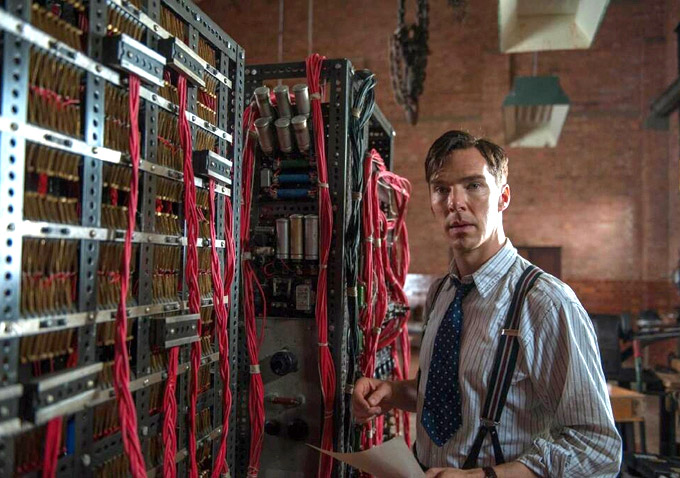By providing your information, you agree to our Terms of Use and our Privacy Policy. We use vendors that may also process your information to help provide our services. This site is protected by reCAPTCHA Enterprise and the Google Privacy Policy and Terms of Service apply.
Stephen Hawking vs. Alan Turing: Who’s Winning The Battle of the British Genius Biopics?

On Sunday night in Toronto, the second ball dropped in what will definitely be an ongoing rivalry through awards season. James Marsh’s “The Theory of Everything” — a biopic about Stephen Hawking and the relationship he had with his first wife Jane — premiered to a standing ovation (though in Toronto, that happens quite a bit). The Focus Features film is slated for release on November 7, just two weeks before a film set to make its Toronto debut tomorrow night, Morten Tyldum’s Alan Turing biopic “The Imitation Game.”
Biopics about important real-life men are clearly not a particularly
interesting facet of awards season. There are at least couple of them
every year, and the best actor Oscar category consistently rewards them
(six of the last 10 winners are examples). But “The Theory of
Everything” and “The Imitation Game” have a lot more in common than just
that. Both British, they are collectively about two of the greatest
minds that came out of the 20th century — theoretical physicist and
cosmologist Hawking and mathematician and computer scientist Turing.
The “Game” was already on when Telluride got the first look at Tyldum’s film, which The Weinstein Company is handling. It takes on the life of Turing, who cracked the Nazis’ Enigma code — helping end World War II years before it could have otherwise. Benedict Cumberbatch plays him, and word out of Telluride certainly made it seem likely the actor is heading for his first Oscar nomination. But things got a lot more heated last night, with Eddie Redmayne immediately getting deserved raves for his performance as Hawking. It’s arguably a much showier role than Cumberbatch’s, and Redmayne’s physical transformation as Hawking’s disease progresses is nothing short of stunning. It’s also unexpectedly comic, with “Theory” doing a great job at naturally infusing its narrative with Hawking’s charms and sense of humor. It sure pleased the crowd last night in Toronto, and it’s hard to imagine it not doing the same with Oscar voters. So is there really room for two men playing remarkable, real-life British geniuses in this year’s best actor race?
 “The Imitation Game” is a lot chillier of a film. Cumberbatch’s performance is very internalized and understandably much less
“The Imitation Game” is a lot chillier of a film. Cumberbatch’s performance is very internalized and understandably much less
charming than Redmayne’s. Turing’s is a tragic story, after
all, and one without any resembling the happy-tears ending that meets
“The Theory of Everything.” Turing — who was secretly gay (as almost
all gay people were in 1945) — killed himself a few years after the war
ended when he was prosecuted for being gay and chemically castrated as a
result. “Crowdpleaser” isn’t exactly a word one can attach to a story like that, though isn’t necessarily a bad thing, Oscar-wise. More real-life characters who have won Oscars were dead at the end of the film than not (including the last two winners of the best actor category).
The more interesting question is probably more about the films themselves and their Oscar chances beyond their lead actors. Including two “long-suffering wives” (like “gay men who die tragically,” a favorite for Oscar voters) in Keira Knightley and Felicity Jones‘ respective performances alongside Cumberbatch and Redmayne. Knightley plays Joan Clarke, who even after she finds out about her finance Turing’s homosexuality (so I guess “long-suffering fag hag” is more suitable designation), stands by him and tries to make the relationship work. Jones is Hawking’s first wife Jane, and notably has a lot more to work with than Knightley: She’s really Redmayne’s co-lead, and given how weak the best actress race is right now (more on that tomorrow), she should campaign as such (Knightley is definitely supporting).
I’d be disappointed if Jones or Knightley don’t end up with nominations, no matter where they campaign and despite the cliche it would be in that happening given their roles. Because they’re both great. But I’d also be disappointed if either film ends up with a best picture nomination. Not that that might not happen. Recent films that managed that feat — like “Dallas Buyers Club” or “Philomena” last year — were similar in their approach to a real-life tale. Standard, conventional, varying degrees of affecting, a few inspired moments… but they aren’t great films. And neither are “The Imitation Game” or “The Theory of Everything,” Toronto standing ovations be damned. They’re pretty standard biopic fare that seem partially created to get Oscar nominations for their actors (who to their credit rise above the material significantly in both instances). Which is fair enough, but I just hope their awards season narrative ends up being exclusive to that.
By providing your information, you agree to our Terms of Use and our Privacy Policy. We use vendors that may also process your information to help provide our services. This site is protected by reCAPTCHA Enterprise and the Google Privacy Policy and Terms of Service apply.

















